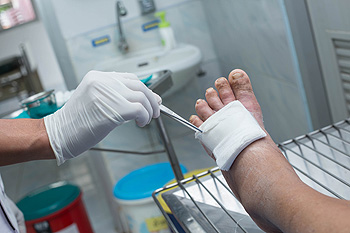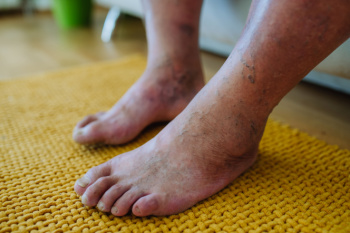

Treating a diabetic foot wound requires careful medical attention to prevent complications and promote healing. A podiatrist starts by cleaning the wound gently with mild soap and water to remove any debris. An antibiotic ointment can then be applied to prevent infection and covered with a sterile bandage. It is important to regularly inspect the wound for signs of infection, such as increased redness or swelling. Managing blood sugar levels is essential, as high glucose can hinder the healing process. Additionally, protect the wound from pressure and friction by using appropriate footwear. Elevating the foot and keeping it dry can also aid in healing. If the wound shows signs of infection or does not improve, seek medical attention promptly from a podiatrist. If you have diabetes and have developed a foot wound, it is strongly suggested that you are under the care of this type of doctor who can treat the wound, and help you to manage this condition.
Wound care is an important part in dealing with diabetes. If you have diabetes and a foot wound or would like more information about wound care for diabetics, consult with Massimo Pietrantoni, DPM from Rochester Podiatry, LLP. Our doctor will assess your condition and provide you with quality foot and ankle treatment.
What Is Wound Care?
Wound care is the practice of taking proper care of a wound. This can range from the smallest to the largest of wounds. While everyone can benefit from proper wound care, it is much more important for diabetics. Diabetics often suffer from poor blood circulation which causes wounds to heal much slower than they would in a non-diabetic.
What Is the Importance of Wound Care?
While it may not seem apparent with small ulcers on the foot, for diabetics, any size ulcer can become infected. Diabetics often also suffer from neuropathy, or nerve loss. This means they might not even feel when they have an ulcer on their foot. If the wound becomes severely infected, amputation may be necessary. Therefore, it is of the upmost importance to properly care for any and all foot wounds.
How to Care for Wounds
The best way to care for foot wounds is to prevent them. For diabetics, this means daily inspections of the feet for any signs of abnormalities or ulcers. It is also recommended to see a podiatrist several times a year for a foot inspection. If you do have an ulcer, run the wound under water to clear dirt from the wound; then apply antibiotic ointment to the wound and cover with a bandage. Bandages should be changed daily and keeping pressure off the wound is smart. It is advised to see a podiatrist, who can keep an eye on it.
If you have any questions, please feel free to contact one of our offices located in Brighton and Greece of Rochester, NY . We offer the newest diagnostic and treatment technologies for all your foot care needs.

Diabetes can significantly impact foot health due to reduced blood circulation and nerve damage, which is known as neuropathy. Poor circulation hampers the delivery of oxygen and nutrients, slowing wound healing and increasing infection risk. Neuropathy diminishes sensation, making it difficult to detect injuries or pressure points, leading to untreated wounds. Proper foot care is essential for individuals with diabetes. Daily inspections for cuts, blisters, or swelling, keeping feet clean and moisturized, and wearing properly fitting shoes are key steps. If you have diabetes, it is suggested that you schedule regular visits to a podiatrist who can monitor foot health, treat issues early, and provide guidance on preventive care.
Diabetic foot care is important in preventing foot ailments such as ulcers. If you are suffering from diabetes or have any other concerns about your feet, contact Massimo Pietrantoni, DPM from Rochester Podiatry, LLP. Our doctor can provide the care you need to keep you pain-free and on your feet.
Diabetic Foot Care
Diabetes affects millions of people every year. The condition can damage blood vessels in many parts of the body, especially the feet. Because of this, taking care of your feet is essential if you have diabetes, and having a podiatrist help monitor your foot health is highly recommended.
The Importance of Caring for Your Feet
Patients with diabetes should have their doctor monitor their blood levels, as blood sugar levels play such a huge role in diabetic care. Monitoring these levels on a regular basis is highly advised.
It is always best to inform your healthcare professional of any concerns you may have regarding your feet, especially for diabetic patients. Early treatment and routine foot examinations are keys to maintaining proper health, especially because severe complications can arise if proper treatment is not applied.
If you have any questions please feel free to contact one of our offices located in Brighton and Greece of Rochester, NY . We offer the newest diagnostic and treatment technologies for all your foot and ankle needs.

Clubfoot is a congenital foot condition where one or both feet are abnormally rotated inward and downward. This condition, present at birth, can restrict a child's ability to walk and may lead to mobility issues if left untreated. The Ponseti method is a widely recognized treatment approach for clubfoot, focusing on gentle manipulation and casting to correct the foot's position. This method involves a series of weekly castings to gradually realign the foot, followed by the use of a brace to maintain the corrected position and prevent recurrence. The Ponseti method, a non-surgical approach, has a high success rate and offers a significant improvement in foot function and appearance. If your child has been born with clubfoot, it is strongly suggested that you include a podiatrist on your healthcare team for optimal correction results.
Congenital foot problems require immediate attention to avoid future complications. If you have any concerns, contact Massimo Pietrantoni, DPM of Rochester Podiatry, LLP. Our doctor can provide the care you need to keep you pain-free and on your feet.
Congenital foot problems are deformities affecting the feet, toes, and/or ankles that children are born with. Some of these conditions have a genetic cause while others just happen. Some specific foot ailments that children may be born with include clubfeet, polydactyly/macrodactyly, and cleft foot. There are several other foot anomalies that can occur congenitally. What all of these conditions have in common is that a child may experience difficulty walking or performing everyday activities, as well as trouble finding footwear that fits their foot deformity. Some of these conditions are more serious than others. Consulting with a podiatrist as early as possible will help in properly diagnosing a child’s foot condition while getting the necessary treatment underway.
What are Causes of Congenital Foot Problem?
A congenital foot problem is one that happens to a child at birth. These conditions can be caused by a genetic predisposition, developmental or positional abnormalities during gestation, or with no known cause.
What are Symptoms of Congenital Foot Problems?
Symptoms vary by the congenital condition. Symptoms may consist of the following:
Treatment and Prevention
While there is nothing one can do to prevent congenital foot problems, raising awareness and receiving neonatal screenings are important. Early detection by taking your child to a podiatrist leads to the best outcome possible.
If you have any questions please feel free to contact one of our offices located in Brighton and Greece of Rochester, NY . We offer the newest diagnostic tools and technology to treat your foot and ankle needs.
 Maintaining foot health is important for overall well-being, and incorporating stretches into your routine can help. One effective exercise is the toe stretch, where you sit comfortably and gently pull your toes apart, holding the position for 15 to 30 seconds. This stretch improves flexibility and relieves tension in the toes. Another beneficial stretch is the calf stretch. Stand facing a wall, place your hands on it, and step one foot back, keeping the heel on the ground. Bend your front knee while keeping the back leg straight, feeling a stretch in the calf and Achilles tendon. Hold this position for 30 seconds before switching sides. This stretch alleviates tightness and enhances overall foot function. Additionally, rolling a golf or tennis ball under your foot can be extremely effective. Sit down, place the ball under your foot, and roll it back and forth for a few minutes. This helps massage the plantar fascia and relieve tension. If you have persistent foot pain or concerns, it is suggested that you visit a podiatrist.
Maintaining foot health is important for overall well-being, and incorporating stretches into your routine can help. One effective exercise is the toe stretch, where you sit comfortably and gently pull your toes apart, holding the position for 15 to 30 seconds. This stretch improves flexibility and relieves tension in the toes. Another beneficial stretch is the calf stretch. Stand facing a wall, place your hands on it, and step one foot back, keeping the heel on the ground. Bend your front knee while keeping the back leg straight, feeling a stretch in the calf and Achilles tendon. Hold this position for 30 seconds before switching sides. This stretch alleviates tightness and enhances overall foot function. Additionally, rolling a golf or tennis ball under your foot can be extremely effective. Sit down, place the ball under your foot, and roll it back and forth for a few minutes. This helps massage the plantar fascia and relieve tension. If you have persistent foot pain or concerns, it is suggested that you visit a podiatrist.
Exercising your feet regularly with the proper foot wear is a great way to prevent injuries and build strength. If you have any concerns about your feet, contact Massimo Pietrantoni, DPM from Rochester Podiatry, LLP. Our doctor can provide the care you need to keep you pain-free and on your feet.
Exercise for Your Feet
Exercise for your feet can help you gain strength, mobility and flexibility in your feet. They say that strengthening your feet can be just as rewarding as strengthening another part of the body. Your feet are very important, and we often forget about them in our daily tasks. But it is because of our feet that are we able to get going and do what we need to. For those of us fortunate enough to not have any foot problems, it is an important gesture to take care of them to ensure good health in the long run.
Some foot health exercises can include ankle pumps, tip-toeing, toe rises, lifting off the floor doing reps and sets, and flexing the toes. It is best to speak with Our doctor to determine an appropriate regimen for your needs. Everyone’s needs and bodies are different, and the activities required to maintain strength in the feet vary from individual to individual.
Once you get into a routine of doing regular exercise, you may notice a difference in your feet and how strong they may become.
If you have any questions please feel free to contact one of our offices located in Brighton and Greece of Rochester, NY . We offer the newest diagnostic and treatment technologies for all your foot and ankle needs.